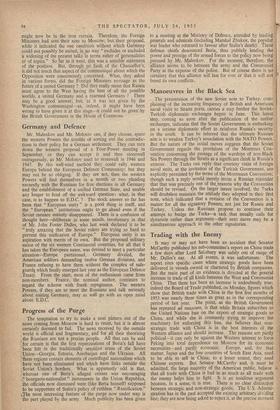Germany and Defence
Mr. Malenkov and Mr. Molotov can, if they choose, spare the western Powers the ,trouble of sorting out the contradic- tions in their policy for a German settlement. They can turn down the western proposal of a Four-Power meeting in September, or they can accept it and then stonewall outrageously, as Mr. Molotov used to stonewall in 1946 and 1947. By this well-tried method they could rally western Europe behind the European Defence Community; but they may not be so obliging. If they are not, then the western Powers will find themselves in a month or two pleading earnestly with the Russians for free elections in all Germany and the establishment of a unified German State, and unable any longer to fend off the awkward question: what, in that case, is to happen to E.D.C. ? The stock answer so far has been that " European unity " is a good thing in itself, and the " European " institutions ought to go ahead even if the Soviet ,menace entirely disappeared. There is a confusion of thought here—deliberate in some minds, involuntary in that of Mr. John Foster Dulles, who last week declared it to be " truly amazing that the Soviet rulers are trying so hard to prevent this unification of Europe." European unity is an aspiration with merits of its own. But the proposed military union of the six western Continental countries, for all that it has taken the European name, was devised to meet a particular situation—Europe partitioned, Germany divided, the American soldiers demanding twelve German divisions, and France refusing to have them without the complex of safe- guardi which finally emerged last year as the European Defence Treaty. From the start, most of the enthusiasm came from non-members. France, the nominal author, continues to regard the scheme with frank repugnance. The western Powers, if they are to meet the Russians and talk seriously about uniting Germany, may as well go with an open mind about E.D.C.


























 Previous page
Previous page